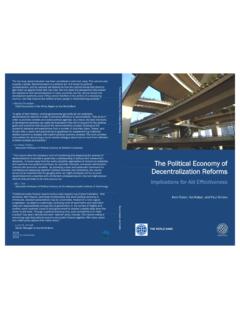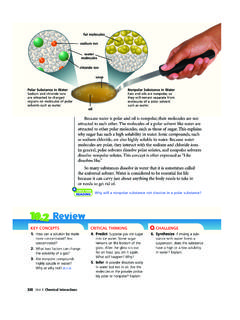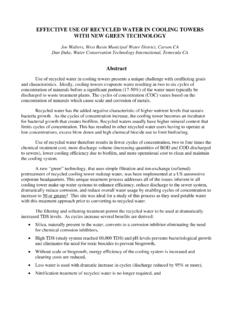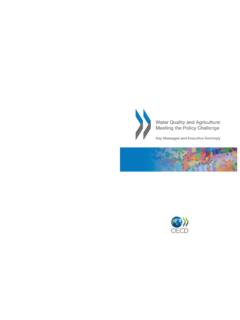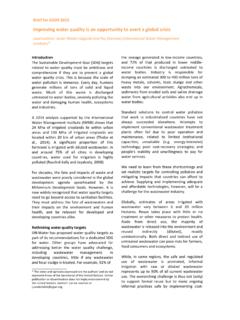Transcription of The Challenge of Reducing Non-Revenue Water (NRW) in ...
1 WAT E R S U P P LY A N D S A N I TAT I O N S E C TO R B OA R D D I S C U S S I O N PA P E R S E R I E S. PAPER DECEMBER 2006. The Challenge of Reducing Non-Revenue Water (NRW). in Developing Countries How the Private Sector Can Help: A Look at Performance-Based Service Contracting Bill Kingdom, Roland Liemberger, Philippe Marin THE WORLD BANK. GROUP. ACKNOWLEDGEMENTS DISCLAIMERS. This report, which is a product of the Energy and Water The findings, interpretations, and conclusions expressed Department (EWD) of the World Bank, was funded by in this paper are entirely those of the authors, and should the Public-Private Infrastructure Advisory Facility (PPIAF), a not be attributed in any manner to the World Bank, to its multi-donor technical assistance facility aimed at helping affiliated organizations, or to members of its Board of developing countries improve the quality of their infrastructure Executive Directors or the countries they represent.
2 The through private sector involvement (for more information, material in this work is copyrighted. No part of this work see ). may be reproduced or transmitted in any form or by any means, electronic or mechanical, including photocopying, The authors would like to thank the following persons for recording, or inclusion in any information storage and their kind cooperation in providing access to information on retrieval system, without the prior written permission of the the case studies presented in this paper: Mr. Martin Shaw World Bank. The World Bank encourages dissemination of (PABW Sdn Bhd, Selangor), Mr. Santi Somboonviboon and its work and will normally grant permission promptly. For Mr. Samphan Oumtrakul (MWA, Bangkok), Mr. Francisco permission to photocopy or reprint, please send a request Paracampos (SABESP, S o Paulo), and Mr.
3 Brian McKeown with complete information to the Copyright Clearance and Mr. Martin Kelly (City of Dublin). Thanks are due also Center, Inc., 222 Rosewood Drive, Danvers, MA 01923, to other World Bank colleagues who have collaborated in USA, fax 978-750-4470. All other queries on rights and providing valuable comments for this paper: Alain Locussol, licenses, including subsidiary rights, should be addressed to Jan Janssens, Jonathan Halpern, and Meike van Ginneken. the Office of the Publisher, World Bank, 1818 H Street , Finally, the authors would like to thank PPIAF for its financial Washington DC, 20433, fax 202-522-2422, e-mail: support. CONTACT INFORMATION. Bill Kingdom, Lead Water and Sanitation Specialist, World Bank: tel. 202-473-9093.
4 Philippe Marin, Senior Water and Sanitation Specialist, World Bank: tel. 202-458-7761. Roland Liemberger, Founder, Liemberger & Partners GmbH: tel. +43-463-500-577. W AT E R S U P P LY A N D S A N I TAT I O N B O A R D D I S C U S S I O N PA P E R S E R I E S. PAPER NO. 8. DECEMBER 2006. The Challenge of Reducing Non-Revenue Water (NRW). in Developing Countries How the Private Sector Can Help: A Look at Performance-Based Service Contracting Bill Kingdom, Roland Liemberger, Philippe Marin The World Bank, Washington, DC. THE WORLD BANK. GROUP. Copyright 2006 The International Bank for Reconstruction and Development/The World Bank. All rights reserved ACRONYMS AND ABBREVIATIONS. ADB Asian Development Bank avg. average AWWA American Water Works Association BOT build-operate-transfer CE compensation event CIS Commonwealth of Independent States conn.
5 Service connection DMA district metered area DoE Department of the Environment EWD Energy and Water Department (World Bank). IBNET International Benchmarking Network for Water and Sanitation Utilities ILI Infrastructure Leakage Index IWA International Water Association km kilometer l liter m meter m3 cubic meter MDG Millennium Development Goal MWA Metropolitan Waterworks Authority (Bangkok). NRW Non-Revenue Water NWC National Water Council OBA output-based aid PPIAF Public-Private Infrastructure Advisory Facility PPP public-private partnership R$ reais (Brazil). SABESP Companhia de Saneamento B sico do Estado de S o Paulo SEAWUN South East Asian Water Utilities Network US$ dollars (United States). WAA Water Authorities Association (United Kingdom).
6 WHO World Health Organization WRc Water Research Centre ii TABLE OF CONTENTS. ACRONYMS AND ABBREVIATIONS ..II. EXECUTIVE THE CASE FOR Non-Revenue Water POTENTIAL FOR PRIVATE SECTOR INVOLVEMENT IN NRW REDUCTION ACTIVITIES ..8. PERFORMANCE-BASED SERVICE CONTRACTING FOR NRW REDUCTION: INTERNATIONAL CASE STUDIES ..11. LESSONS LEARNED AND OVERALL APPENDIX 1. Non-Revenue Water : THE TECHNICAL ISSUES ..33. iii EXECUTIVE SUMMARY. One of the major issues affecting Water utilities in the developing world is the considerable difference between the amount of Water put into the distribution system and the amount of Water billed to consumers (also called Non-Revenue Water [NRW]). High levels of NRW. reflect huge volumes of Water being lost through leaks, not being invoiced to customers, or both.
7 It seriously affects the financial viability of Water utilities through lost revenues and increased operational costs. A high NRW level is normally a surrogate for a poorly run Water utility that lacks the governance, the autonomy, the accountability, and the technical and managerial skills necessary to provide reliable service to their population. The waste of resources resulting from high NRW levels in developing countries is consid- erable. To illustrate this point, the study begins with a global overview of the situation and what it means in terms of foregone services to new consumers and the financial costs to utilities. The total cost to Water utilities caused by NRW worldwide can be conservatively estimated at $141 billion per year, with a third of it occurring in the developing world.
8 In developing countries, about 45 million cubic meters are lost daily through Water leakage in the distribution networks enough to serve nearly 200 million people. Similarly, close to 30 million cubic meters are delivered every day to customers, but are not invoiced because of pilferage, employees' corruption, and poor metering. All this directly affects the capacity of utilities in developing countries to become financially viable and fund necessary expansions of service, especially for the poor. Although it is not feasible to eliminate all NRW in a Water utility, Reducing by half the current level of losses in developing countries appears a realistic target. This reduction could generate an estimated additional $ billion in cash every year for the Water sector (from both increased revenues and reduced costs) and potentially service an additional 90 million people without any new investments in production facilities nor drawing further on scarce Water resources.
9 Figures of such magnitude, even though they are based on a rough estimate, should obviously capture the attention of donors and developing-country governments alike. If the reasons for Reducing levels of NRW are so compelling, then why hasn't this wide- spread and generally well-understood Challenge already been tackled and defeated? The reason is that Reducing NRW is not just a technical issue but also one that goes to the heart of the failings of public Water utilities in developing countries. These Water utilities often operate under a weak governance and financial framework, with utility managers having to face multiple political and economic constraints. They have to pro- vide some form of service to customers on a daily basis with mostly deteriorated infra- structure.
10 In addition, they often lack the proper incentives as well as the specialist management and technical expertise necessary to carry out an effective NRW program. This is where the private sector could be of assistance, and a wide range of options are available, from delegated management contracts at one extreme (that is, public-private partnerships [PPPs] such as concessions, leases/affermages, or management contracts) to service contracts, limited subcontracting of specific activities, or both, at the other. 1. All dollar amounts are in dollars unless otherwise indicated. v Although there have been many PPP projects during recent decades in developing coun- tries that have led to notable improvements in NRW levels, the overall experience with service contracts designed mostly around technical assistance has been disappointing.




